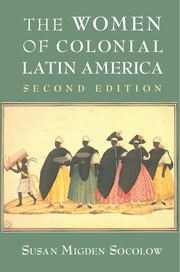Book contents
- Frontmatter
- Dedication
- Contents
- List of Figures
- Acknowledgments
- Introduction: Why Women?
- Chapter One Iberian Women in the Old World and the New
- Chapter Two Before Columbus: Women in Indigenous America and Africa
- Chapter Three Conquest and Colonization
- Chapter Four The Arrival of Iberian Women
- Chapter Five Women, Marriage, and Family
- Chapter Six Elite Women
- Chapter Seven The Brides of Christ and Other Religious Women
- Chapter Eight Women and Work
- Chapter Nine Women and Slavery
- Chapter Ten Women and Social Deviance
- Chapter Eleven Women and Enlightenment Reform
- Conclusion
- Documents
- Suggested Further Reading
- Index
- Plate section
- References
Chapter One - Iberian Women in the Old World and the New
Published online by Cambridge University Press: 05 February 2015
- Frontmatter
- Dedication
- Contents
- List of Figures
- Acknowledgments
- Introduction: Why Women?
- Chapter One Iberian Women in the Old World and the New
- Chapter Two Before Columbus: Women in Indigenous America and Africa
- Chapter Three Conquest and Colonization
- Chapter Four The Arrival of Iberian Women
- Chapter Five Women, Marriage, and Family
- Chapter Six Elite Women
- Chapter Seven The Brides of Christ and Other Religious Women
- Chapter Eight Women and Work
- Chapter Nine Women and Slavery
- Chapter Ten Women and Social Deviance
- Chapter Eleven Women and Enlightenment Reform
- Conclusion
- Documents
- Suggested Further Reading
- Index
- Plate section
- References
Summary
There are very few noble women who are beautiful, wise, soft, captivating, rational, and clean in all things that pertain to women and who are not covetous and envious of that which other women have. There are few women who are sincere and who do not contradict everything a man may say, do, or dictate, but rather are happy to accommodate his desires. But even though noble women with good attributes are difficult to find, men cannot live without them. Therefore, men must learn the ways to acquire their love.
At the time of the discovery of the New World, a queen sat on the throne of Spain. Isabel I was a strong, even dominant woman. A fanatical defender of the Holy Roman Catholic faith, she was instrumental in imposing religious unity on both her own country and neighboring Portugal. At the same time, she fiercely maintained the juridical independence of Castile and established the laws of her kingdom as the foundation of Latin American jurisprudence. But Spain itself was the product of several traditions, as well as the conflicting experiences of warrior and mercantile societies. Church, law, and tradition all affected the role of women in the Iberian Peninsula and by extension in the American colonies.
Because both Spain and Portugal had experienced years of Moslem conquest, followed by years of Christian reconquest, the position of women in the Iberian Peninsula was quite different from that throughout the rest of Europe. The role of women in these societies reflected the combined effect of Islam and Roman Catholicism. On the one hand, the Islamic ideal of the cloistered, sheltered woman, the woman protected in the home or the harem, continued to resonate in Iberian society, as did the strong link between female virginity and honor. On the other hand, the gap between the idealized conduct of women and their real behavior was sizable. Women in Christian society, for example, especially the rural peasants, enjoyed a good degree of independence. Furthermore, women in Iberian societies benefited from legal rights that went far beyond those accorded to other European women at the time.
- Type
- Chapter
- Information
- The Women of Colonial Latin America , pp. 5 - 16Publisher: Cambridge University PressPrint publication year: 2015



